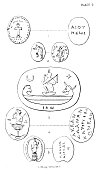
Click to enlarge
Plate C

Click to enlarge
Plate C
1. Terminal figure, perhaps allusive by its form to Justinus' Æon, "The Cross." The interminable legend surrounding it yields no intelligible words, but the title below the Herme, ΝΙΧΑΡΟΠΛΗC occurs also on a talisman in the French Cabinet. The reverse gives the Seven Vowels (or "Voices") that shroud the Ineffable Name, which has never been uttered aloud since the day of the destruction of the Temple, but is communicated only in half-whispers to every Rabbi upon his ordination. It is a remarkable fact that a Talmudist, who remembered the Second Temple, observes that this Holy Name was "warbled rather than pronounced" in the course of the service; hence we may suspect the possibility of imitating its sound by the permutation of vowels that form so important an element in the construction of our talismans.
2. Father Nile, reclining and holding forth a cornucopia, emblematic of amity. * As the "number of his Greek name," 365, is equivalent to that of Abraxas, it is probable that, according to Kabbalistic rules, he here represents that god. This explanation is supported by the type of the reverse, Horus, seated on the lotus, addressed by the Greek transliteration of the Hebrew Ablanathanalba, "Thou art our Father!"
3. Horus seated in the baris, or sacred boat; the prow and poop whereof terminate in the hawk's head of Phre, and the ox-head of Apis. He is here addressed by the Ineffable Name.
4. The same deity, addressed as before by the salutation Ablanathanalba, followed by an unintelligible word. The unskilful gem-engraver, unable to form curves in the lettering, has given to his B the form of K, and increased the difficulty of deciphering this legend.
5. The same, but now seated upon the scarabæ, type of the Creator,
enclosed within the coiled serpent, emblem of Eternity. With these purely Pharaonic sigils the reverse combines the name of the Jewish angel Michael, and the Seven Vowels of the Ineffable Name; thus presenting an instructive example of that reconciliation of, apparently, the most antagonistic creeds which is the very foundation of Gnosticism.
436:* The type also of an Alexandrian coin of Hadrian.